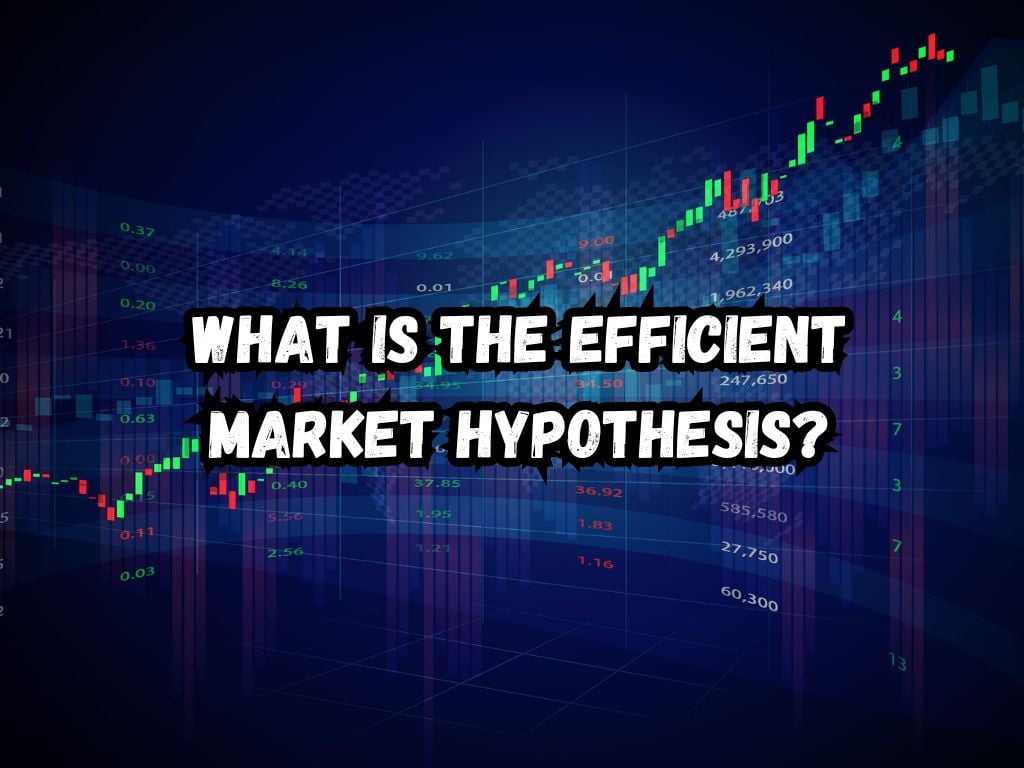The Efficient Market Hypothesis (EMH) stands as a cornerstone of modern financial theory. It suggests that all known information is already reflected in stock prices.
According to EMH, it’s impossible to “beat” the market through expert stock selection or market timing.
This article delves into what is the efficient market hypothesis, exploring its origins, various forms, implications for investors, and the ongoing debate surrounding its validity.
Brief History of EMH
The roots of the Efficient Market Hypothesis trace back to the early 20th century. However, it was Eugene Fama who, in the 1960s, formally introduced EMH to the academic world.
Fama’s work heralded a new era in the understanding of how markets operate, setting the stage for decades of debate and study.

What Is Efficient Market Hypothesis?
At its core, market efficiency is the idea that financial markets effectively incorporate all available information into asset prices. Under EMH, it’s assumed that prices on traded assets, like stocks, bonds, or property, already reflect past, present, and even future information.
The implications are vast, suggesting limited, if any, gains from trading on information.
Three Forms of EMH
EMH presents itself in three distinct forms: weak, semi-strong, and strong, each differing in its assumptions about which types of information are fully absorbed by market prices.
Weak-Form Efficiency
Weak-form efficiency posits that all past trading information is reflected in stock prices. This form of EMH suggests that technical analysis, or the study of past stock prices in an attempt to predict future prices, offers no added advantage to investors.
Semi-Strong Form Efficiency
Semi-strong form efficiency takes it a step further, asserting that all publicly available information (not just past trading data) is accounted for in stock prices.
This suggests that fundamental analysis, which examines financial statements and industry trends, cannot consistently produce excess returns.
Strong-Form Efficiency
The strongest version of EMH claims that all information, public and private, is fully reflected in asset prices. According to strong-form efficiency, not even insider information could give an investor an advantage.
This form of EMH is the most controversial and the most debated among the three.
Arguments Supporting EMH
Many studies have lent support to EMH, showcasing how difficult it is for investors to outperform the market consistently over the long term.
The random walk theory, closely associated with EMH, argues that stock prices move unpredictably, making it impossible to predict future movements based on past or present information.
Criticisms of EMH
Despite strong support, EMH has faced significant criticism. Market anomalies, such as the January effect (where stocks have historically performed better in January than in other months), challenge EMH’s assumptions.
Critics argue that psychological factors, irrational behavior, and other inefficiencies can lead to predictable patterns in stock prices.
EMH and Investment Strategies
EMH has profound implications for investment strategies. If markets are truly efficient, then passive investment strategies, which track a market index, should perform as well as or better than active strategies that attempt to outperform the market.
This reasoning underpins the popularity of index funds among investors who adhere to EMH.
EMH in Modern Markets
The relevance of EMH in today’s market is a subject of ongoing debate. Advances in technology and the rise of algorithmic trading have dramatically increased the speed at which information is incorporated into market prices.
These changes raise questions about the levels of efficiency in modern financial markets.

Pro Tips
Investors considering EMH in their strategy should focus on diversification and long-term investment goals.
Despite debates about market efficiency, a well-diversified portfolio can help manage risk and achieve steady returns over time.
Additionally, staying informed about market trends and understanding the limitations of EMH can guide more informed investment decisions.
Frequently Asked Questions
How does the Efficient Market Hypothesis impact individual investors?
For individual investors, EMH suggests that attempting to outperform the market through active trading is unlikely to yield consistent, long-term gains. Instead, adopting a passive investment strategy might be more beneficial.
Can EMH coexist with market anomalies?
While market anomalies present challenges to the strict interpretation of EMH, some scholars argue that anomalies themselves may be rationalized within certain forms of the hypothesis or attributed to market participants’ overreaction.
How has EMH evolved with the advent of high-frequency trading?
High-frequency trading and advanced information technologies have intensified the debate around EMH. These developments have made markets more efficient in processing information, yet they also highlight instances of inefficiency and exploitation by those with advanced tools.
What role, if any, can a financial analyst play in an efficient market?
In an efficient market, a financial analyst’s role may shift from identifying undervalued stocks to providing broader financial planning and advice, focusing on long-term investment strategies and risk management.
Is the Efficient Market Hypothesis applicable to all asset classes?
While EMH is most often discussed in the context of stock markets, its principles can apply to any asset class. However, the degree of efficiency might vary between markets, affected by factors such as market depth, liquidity, and information availability.
Conclusion
The Efficient Market Hypothesis offers a fundamental view of market operations, suggesting that exploiting market inefficiencies is no straightforward task.
While evidence exists both supporting and challenging EMH, it remains a vital concept in financial theory, influencing investment strategies and market analysis.


 Tags:
Tags:










